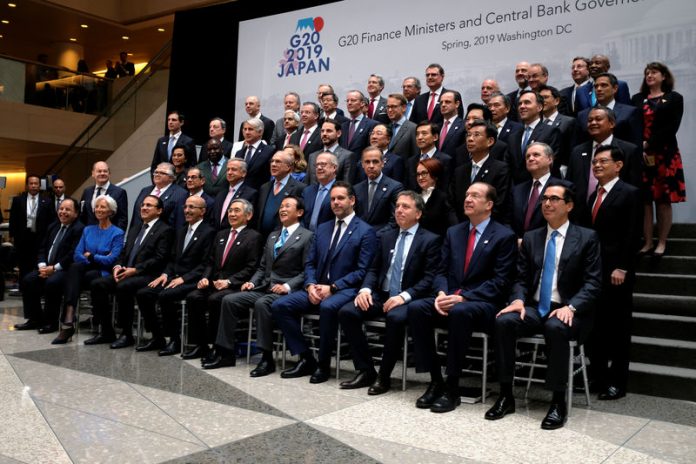WASHINGTON: The risk that global economic growth could slow more than expected spurred a call from top finance officials for countries to overcome trade differences and opt for multilateral cooperation and “timely policy action.”
Policymakers from the Group of 20 industrialized countries are worried that the weakness evident in key economies could spread, especially if elevated trade tensions, such as those between the United States and China, escalate further.
“The balance of risks remains skewed to the downside,” Japanese Finance Minister Taro Aso said at a news conference following a meeting of G20 finance ministers and central bankers. “We recognize the risk that growth prospects might deteriorate if weakening in key economies feed into each other.”
Aso’s remarks dovetail with those of other officials gathered in Washington for the spring meetings of the World Bank and International Monetary Fund, many of whom fret that self-inflicted wounds from protectionist trade policies are to blame for the weakness. The week’s proceedings kicked off with another downgrade of global growth estimates from the IMF.
Bank of Japan Governor Haruhiko Kuroda emphasized the need for countries to take steps to foster a more dynamic global economy.
“There was a shared understanding among the G20 members that each country needs to take timely policy action,” Kuroda said at the news conference.
As the chair country of this year’s G20 proceedings, Japan wants to deepen talks on global imbalances – an effort to divert Washington’s attention from bilateral trade imbalances and stave off US pressure to negotiate two-way trade deals.
German Finance Minister Olaf Scholz, speaking at an event on the sidelines of the meetings in Washington, said the rules-based order of multilateralism is increasingly under threat and leaders must uphold international cooperation.
Scholz called on the United States to overcome trade differences with Europe, which erupted again this week when US President Donald Trump threatened to impose tariffs on $11 billion worth of European Union products, including commercial aircraft.
“I believe this is a matter of principle, it’s not just about achieving some short-term economic gain. It’s not about the art of the deal,” Scholz said in reference to the best-selling business advice book credited to Trump.
Scholz’s consternation is understandable given the global downshift in growth is most evident at the moment in Europe, where the outlook has been further clouded by the uncertainty over Britain’s departure from the European Union.
An internal European Central Bank model presented to policymakers on Wednesday indicates eurozone growth was just above 0.2pc in the first three months of the year and could be somewhat weaker in the second quarter, two sources revealed on Friday.
IMF FUNDING
The Trump administration was also at odds with other IMF stakeholders on the need to boost the global lender’s resources and update its governance, although it does support extending a portion of the IMF’s $254 billion crisis fund.
Treasury Secretary Steven Mnuchin repeated the US opposition to increase overall funding and shareholding quotas, likely meaning the effort to lift IMF funding and reshuffle voting rights was a dead issue at this week’s meetings.
The voting quotas were last altered nearly a decade ago.
“In our view, the IMF currently has ample resources to achieve its mission, and countries also have considerable complementary resources should a crisis emerge,” Mnuchin said in a statement for the IMF’s steering committee meeting that was posted on the IMF’s website.
Without US backing for an update to the IMF’s stakeholding weights, there was little prospect for a change at this week’s meetings.
“There is no majority in sight for any changes regarding IMF quotas,” a German official said on condition of anonymity.
The IMF’s last quota increase was agreed in 2010, boosting the shareholding and influence of major emerging markets including China and Brazil.
The IMF has current total lending capacity of about $1 trillion, including the New Arrangements to Borrow crisis fund that was greatly expanded in 2009 at the depths of the last financial crisis.
That fund is set to expire in November 2022. Mnuchin said it was important for the IMF to maintain sufficient financial resources to respond to potential crises.
British finance minister Philip Hammond expressed concern the lack of a funding boost could hamper the IMF’s ability to step in to help Venezuela respond to its worsening humanitarian and economic crisis.
“This set of meetings is crucial to the debate about IMF quotas and funding for the IMF,” Hammond said.
“We all anticipate that as events unfold in Venezuela, at some point there will be a need for a major program to support Venezuela. So the UK is very keen to ensure that the IMF, in particular, is properly funded.”
Oil-rich Venezuela is embroiled in political and economic turmoil as socialist President Nicolas Maduro battles to retain power in the face of U.S. and Western powers’ backing of opposition leader Juan Guaido.
IMF and World Bank shareholders, meanwhile, are still undecided on whether to recognize Guaido as the South American nation’s leader.




